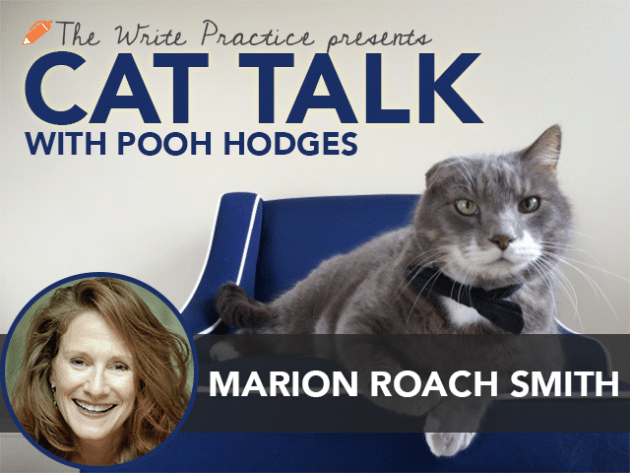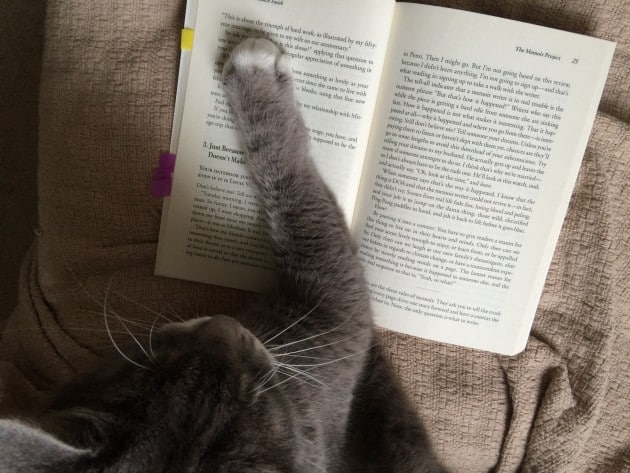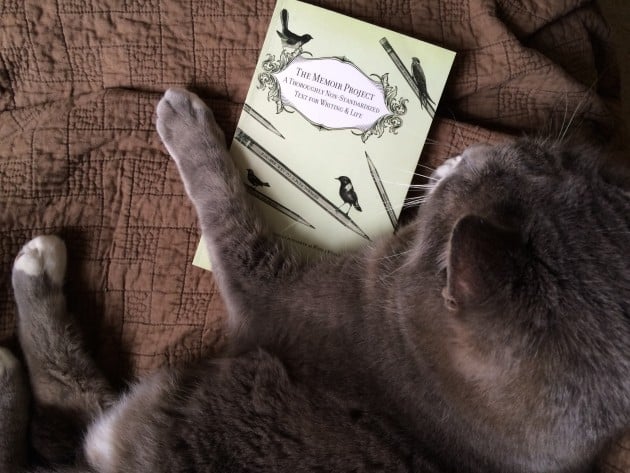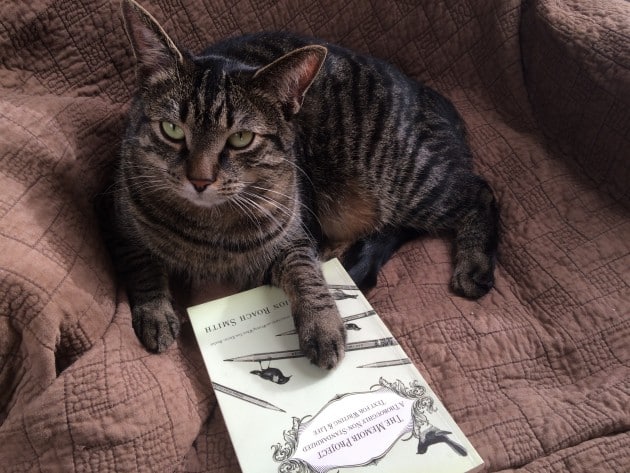For several years I have thought about writing my memoir. But, I wasn't really sure how to proceed. Was I supposed to write about every mouse I had ever caught? Do I start my story where I was captured in an alley during a rain storm? I was desperate to find out how to tell my story.

Have you ever thought about writing a personal story from your life, a memoir? But you weren't sure where to start? Do you wake up every morning devastated because you don't know how to write memoir?
Oh, the pain, the agony! I don't know how to write a memoir. I can't stand it. I need help. Oh, if only I had someone to help me!
The simple answer would be for you to buy a book. The Memoir Project: A Thoroughly Non-Standardized Text for Writing & Life by Marion Roach Smith. The book would answer all of your questions about memoir. But, that would defeat the whole purpose of Cat Talk.
Hi readers. Buy this book. The end.
Marion Roach Smith was kind enough to answer a few questions about writing memoir. May I please have the honor of introducing you to my favorite memoir writer.
Marion Roach Smith Chats With a Cat About Writing a Memoir
POOH HODGES
Why should people or cats bother to write their memoir? Does anyone really care about a cat’s life?
MARION ROACH SMITH
Memoir is a genre, not a tome, and we should write memoir only when we have something to say.
Cats are born memoirists, and all humans should adopt the Feline Idea of Appropriate Timing (FIAT). Cats think before they pounce. Oh, how the world would benefit if humans did the same. Giving thought to our feelings and our responses to those feelings, we not only put some distance between one and the other, but we gain perspective. And that’s a far better place to write from than from the mere diary point of view, the sheer reactionary point of view or, worst of all, the look-at-me! point of view. Cats, of course, are worthy of every ounce of attention we can bring them. Humans? Not so much. We should actually have something to say before we say it.
POOH
How do I begin writing my memoir, Marion? What should I do first? Do I start in the back alley where I was born?
MARION
Oh, don’t do that. Instead, begin by thinking about what interests you. What do you want to write about? One hint: The answer to that should not be “myself,” for memoir is not about you. It is about something – that is, if you want anyone to read it. Perhaps you’d like to write about what cats bring to the lives of humans. So ask yourself, what do they bring, exactly? Love? Humor? Devotion? Love includes devotion and, if you are very lucky, no small amount of humor. So maybe the book is about love.
Next, you need an argument. All pieces of non-fiction – including memoir – are an argument. Try this: Life is hard unless you have a good cat to love.
Then your assignment becomes proving that argument by using scenes from your life. Your goal: by the end of the book, the reader will believe that life would indeed be better with a good cat to love. It’s as simple – and as complicated – as that.
POOH
Are there basic guidelines I am supposed to follow, Marion? Should I just start writing from the beginning of my life story and tell everyone how many mice I have caught?
MARION
That would get repetitive, wouldn’t it? Details are the currency of story and, much like when we travel, we exchange ours for yours when we enter your tale. But we expect to spend all of that currency while we’re there, cashing in those details along the way, and as we do, we buy into your argument.
Asking yourself the “what is this about?” and “what is my argument?” questions for each of your writing ideas will determine if the piece is a blog post, a personal essay, or a book-length piece of memoir. Memoir is a genre that comes in all shapes and sizes. I’ve devised a little algorithm for fitting an idea to a length, and here I’ll offer it to your readers as a gift. Here it is:
It’s about x as illustrated by y to be told in a z
Run through that algorithm, the mice you’ve caught might look like this: It’s about thrill, as illustrated by my hunting life, to be told in a blog post.
See how this works? Use it every day, and you’ll write volumes of good memoir that others will want to read.
POOH
What do you mean when you say to write a story like a bagel? Could I write it like a mouse? I don't eat bread.
MARION
But your readers like bagels, Pooh. And the bagel works for writing short personal essays, where you begin with an image or an idea and circle back to it at the end. Think of it as eating around your food bowl – start at the top and eat ‘round the rim, and then return to the top – and you’ll find it deeply satisfying.
POOH
What is a memoir Marion if the story is not about me?
MARION
Memoir is about territory, and that territory is smaller than you think. Its borders are your areas of expertise. I am a wife, a mother and a sister. I am the one who names the family animals, and the speaker at family funerals. You, too, have many areas of expertise outside your professional world, and you want to write from one territory, one area of expertise, at a time. Do so, and you’ll find that you have seven or eight book-length memoirs in you, hundreds of personal essays, a good number of op-eds, and all the blog posts a creature can possibly write.
POOH
How do I find the structure of my long-form memoir? (I know the answer. It is on page seventy-three of your book. I am supposed to reduce my book idea to one sentence. I didn't want you to think I wasn't paying attention. But, I did put the book down and take a catnap before I wrote my one sentence.)
MARION
Structure is how you will deploy your argument for the reader. In long‐form memoir, the only way to find a structure is to first reduce your book idea to one sentence. Let’s make it really simple and merely rework that original argument we used about cats and life, making your one sentence, Life is really hard unless you get a good cat to live with.
Now let’s break down each phrase: Life. Is hard. Really hard. Unless. You get. A good cat. To live with. There are your seven chapters.
Life: Who you are. Is hard. Really hard: First show us hard, then show us really hard. One chapter each.
Unless: This is where you show us that you are open to alternatives.
You get: This is where you show us all the things you’ve tried in order to make your life better, like speed dating, dieting, drinking heavily, perhaps.
A good cat: Maybe you’ve had bad cats or good cats. Tell us.
To live with: Show us living with that one good cat. Maybe there is a sad ending. Or a happy one. Or a sad one turned happy when the good cat dies and you have the courage to try again with a new cat. See how this works?
POOH
Your father was a writer. Did he give you any advice about writing? Will you please share his advice with us? My father was a mouser and told me to take my time hunting.
MARION
My father was a sportswriter. He was also the typist for the seven cats who agreed to let us live with them. And while I was away at college, letters came to me from each of those cats, relating the family news, some of which was not good. My father was dying at the time, and yet these letters remain among my fondest possessions. Good writing is a gift beyond rubies.
My father had only one rule: Write everything like a letter home. It’s fine advice. In a letter home you rarely tell the people who raised you how great you are, or how smart; how you do everything right, or that you are unique. Instead you tend to talk about ideas you are having, and things you’ve tried and failed.
POOH
How should a writer approach editing their memoir. How can I tell when I should take out a scene? Should I include all the scenes where I was put in a cat carrier in the bottom of an airplane?
MARION
Your first draft is your vomit draft. Just hurl it all up like a hairball. It should stink, as well as contain all manners of unneeded material. After that, the real writing begins, since everything happens in the rewriting.
Editing is unpacking. Toss out anything that is not on topic, does not heighten and add to that argument, or that is repetitive. Many drafts in, after I’ve gotten where I want to be intellectually, I’ll circle every adjective and consider each for its value: Is it doing the work I need it to do? Same with verbs. They get their own edit. I can spend a good part of the day looking for the right word for blue, and why wouldn’t I? It was Mark Twain, a known cat lover, who said, “The difference between a word and the ‘right’ word is the difference between the lighting bug and the lightning.” I’m fairly sure he’s worth taking writing advice from, aren’t you?
POOH
Is there something else you would like to tell us about writing memoir that I didn't ask?
MARION
That writing memoir has consequences. I don't know how I feel about anything until I write it down. Be prepared to figure out stuff when you write memoir. It’s a whole new life when you do, since much like in life, success in writing depends on which details you choose to emphasize.
The end of the interview.
I love Marion's answers. She really knows how to write memoir. If I didn't know better, I would think she is a cat.
I give all of the books on Cat Talk a mouse rating. Like Amazon does with stars, but I use mice. I'll bet you know how many The Memoir Project gets. That's right, Five Mice. If I could give it an extra mouse I would.
Because I chose the authors I interview. I always choose books and authors I love.
And now it is your turn. Have you ever wanted to write a memoir? Share in the comments.
PRACTICE
For practice today Marion Roach Smith has an idea: “Use the ‘It is about x as illustrated by y to be told in a z,'algorithm for fifteen minutes, taking story ideas, particularly ones that are still in a drawer or a file, to figure out what they are about, what they illustrate, and where in the glorious world of writing to publish them.”
Write for fifteen minutes then share your story here in the comments section.
Please be kind and read someone else’s story and make a comment. Everyone's story matters. Even if you are a cat.
Pooh Hodges is the cat who writes. He is an author, an entrepreneur and a visionary. He dictates to his typist every morning before he takes a nap in a sunbeam. He is currently writing his memoir, a tragic tale of loss and redemption.
Pooh would love to be your friend and he would love to connect with you on his blog, thecatwhowrites.com






Hi Pooh, nice to meet you. I’m Maitri, an awesome all white female feline, and guess what? I’m writing my memoir! I do all the thinking and adventures, and my human (“Nettie”) does the typing and photography. She knows Marion (who she thinks is way cool) cuz they talked about Nettie’s own human memoir. Copycat. Whatever… it’s a very memoiry place here! I hope you have a lovely day.
Great post Pooh. Can’t wait to read your work.
Hey, Pooh. That was a cat-tastic interview. You really know how to ask the direct questions. Thanks for getting some great advice for us from Marion. Good luck with your memoir.
Love this interview, Pooh! You are insightful, and a great writer, too!